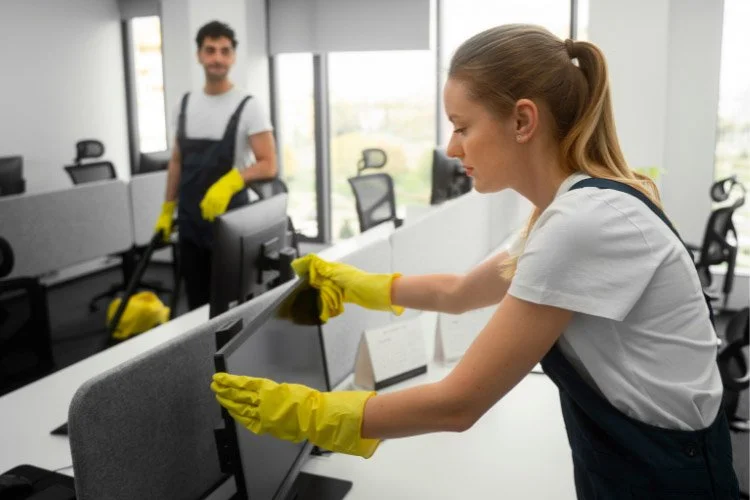What Kind of Training Do Professional Cleaners Go Through Before Entering Your Home or Office?
May 12, 2025
When you hire a professional cleaning service, you’re not just paying for a tidy space—you’re investing in trained individuals who understand how to clean effectively, safely, and respectfully. Professional cleaners aren’t just handed a mop and sent on their way. They undergo structured training that equips them with the knowledge, techniques, and etiquette required to provide high-quality service.
Let’s take a closer look at what kind of training professional cleaners receive before stepping into your home or office.
1. Understanding Cleaning Products and Equipment
One of the first things cleaners learn is how to safely use a wide range of cleaning products and tools.
Product Knowledge: Cleaners are trained to recognize the right solutions for different surfaces—using glass cleaners on mirrors, non-abrasive solutions on wood, and disinfectants where necessary.
Safe Handling of Chemicals: This includes proper dilution, usage, and storage of cleaning agents to prevent accidents or health risks.
Tool Training: Cleaners learn to operate everything from vacuum cleaners and floor polishers to microfiber cloths and steamers effectively and efficiently.
This foundational knowledge ensures both cleanliness and safety in every space they clean.
2. Techniques for Different Types of Cleaning
Not all spaces require the same approach. Professionals are trained in a variety of cleaning methods depending on the job.
Residential vs. Commercial Cleaning: Each environment has different requirements. For example, homes may require attention to delicate furniture or pet-friendly products, while offices may involve larger square footage and high-touch electronics.
Standard vs. Deep Cleaning: Cleaners are taught the differences between routine surface-level cleaning and detailed deep cleaning tasks, such as scrubbing grout or cleaning behind appliances.
Specialty Areas: Bathrooms, kitchens, and medical spaces demand specific sanitation procedures to avoid cross-contamination.
This skillset allows cleaners to adapt their approach to the unique needs of your space.
3. Time Management and Task Prioritization
Efficiency is key in professional cleaning. Cleaners are trained to manage their time while maintaining attention to detail.
Cleaning Checklists: These help ensure that no task is overlooked, even in larger or more complex spaces.
Task Sequencing: Professionals learn the most logical order to clean a space—such as dusting before vacuuming or cleaning kitchens top-to-bottom.
Productivity Techniques: Cleaners are trained to work methodically, focusing on one area at a time without rushing or cutting corners.
These practices result in a consistently clean space without wasted time or energy.
4. Safety and Hygiene Protocols
Working in different environments means encountering various safety and hygiene challenges. Cleaners receive training to protect themselves and the people they serve.
Personal Protective Equipment (PPE): Depending on the job, cleaners may wear gloves, masks, or protective clothing.
Health Precautions: Especially in post-COVID times, cleaners are trained in proper disinfection protocols and avoiding the spread of germs.
Risk Awareness: Cleaners learn how to identify and avoid potential hazards such as wet floors, electrical appliances, or biohazards.
These protocols ensure that cleaning is not only effective but also safe for everyone involved.
5. Professionalism and Customer Etiquette
Professional cleaners are guests in your home or workplace, so they’re trained in more than just cleaning—they also learn how to conduct themselves respectfully and professionally.
Communication Skills: They’re taught to listen to client requests, ask clarifying questions, and respond politely.
Confidentiality and Respect for Privacy: Cleaners understand the importance of treating your space with care and discretion.
Punctuality and Presentation: Cleaners are trained to arrive on time, dressed appropriately, and ready to work.
This soft-skills training ensures a positive and respectful experience during every visit.
Conclusion
When you invite a professional cleaner into your home or office, you’re benefiting from a comprehensive training process that covers much more than how to wipe down a counter. From safety protocols and technical skills to respectful behavior and time management, cleaners are equipped with everything they need to deliver a polished, secure, and satisfying experience.
If you're looking for a reliable and well-trained cleaning team, Sweep Cleaning Services Burnaby is here to help. Contact us today to request a quote and experience the difference that professionally trained cleaners can make in your space.
Let’s Keep In Touch

